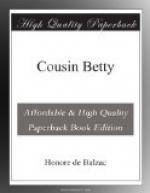“Of what?”
“Of the Press, Monsieur le Depute, of the left centre.”
“What, then, can I do?” said Hulot, after a pause.
“Well, you are the Family,” said the official. “That settles it; you can do what you please. But as to helping you, as to using the Police as an instrument of private feelings, and interests, how is it possible? There lies, you see, the secret of the persecution, necessary, but pronounced illegal, by the Bench, which was brought to bear against the predecessor of our present chief detective. Bibi-Lupin undertook investigations for the benefit of private persons. This might have led to great social dangers. With the means at his command, the man would have been formidable, an underlying fate—”
“But in my place?” said Hulot.
“Why, you ask my advice? You who sell it!” replied Monsieur Chapuzot. “Come, come, my dear sir, you are making fun of me.”
Hulot bowed to the functionary, and went away without seeing that gentleman’s almost imperceptible shrug as he rose to open the door.
“And he wants to be a statesman!” said Chapuzot to himself as he returned to his reports.
Victorin went home, still full of perplexities which he could confide to no one.
At dinner the Baroness joyfully announced to her children that within a month their father might be sharing their comforts, and end his days in peace among his family.
“Oh, I would gladly give my three thousand six hundred francs a year to see the Baron here!” cried Lisbeth. “But, my dear Adeline, do not dream beforehand of such happiness, I entreat you!”
“Lisbeth is right,” said Celestine. “My dear mother, wait till the end.”
The Baroness, all feeling and all hope, related her visit to Josepha, expressed her sense of the misery of such women in the midst of good fortune, and mentioned Chardin the mattress-picker, the father of the Oran storekeeper, thus showing that her hopes were not groundless.




